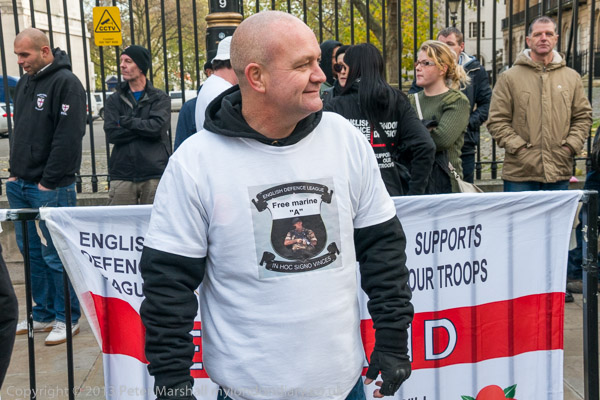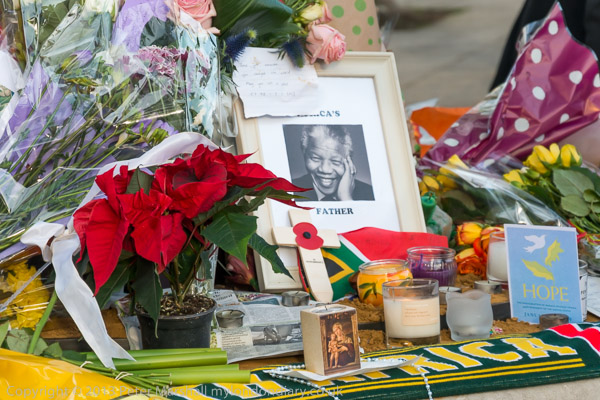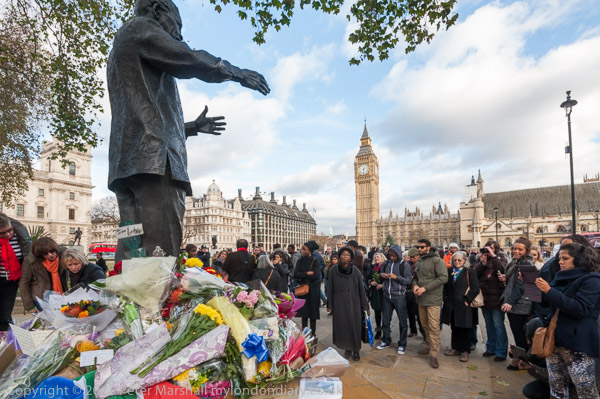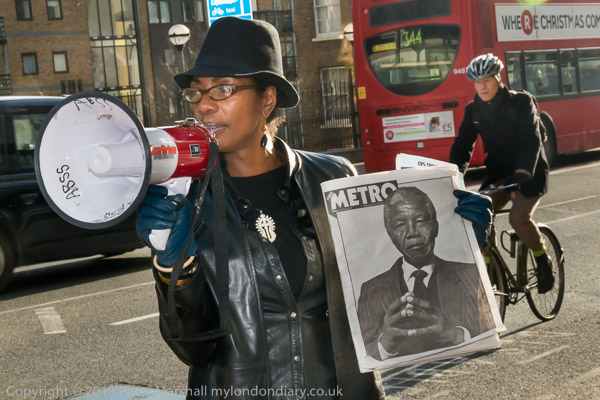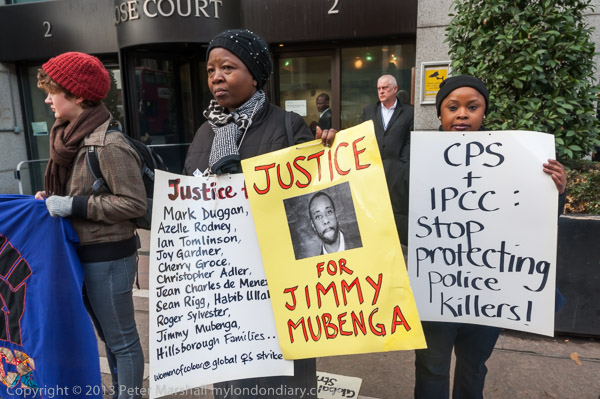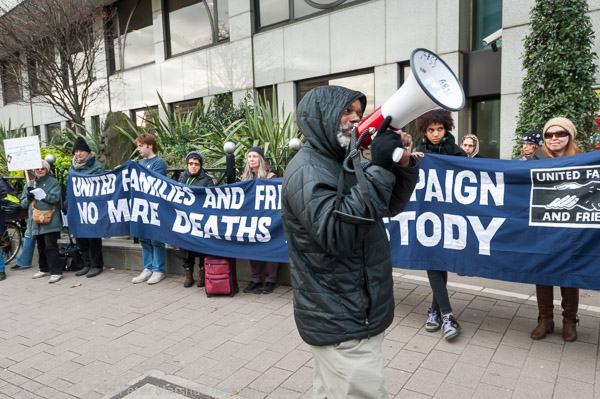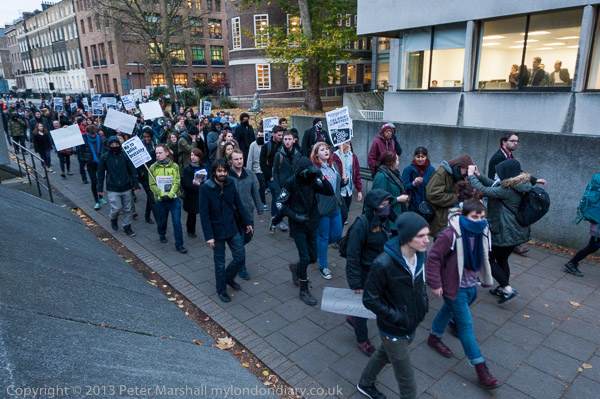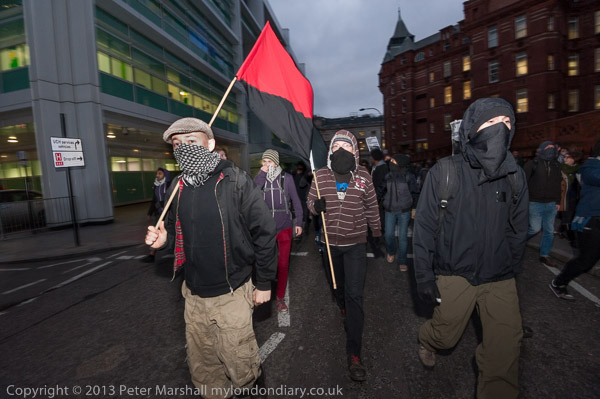Bring All the Troops Home NOW: CND and Stop The War had called for a march to Parliament on 8th October 2007 to arrive when Gordon Brown was making his statement to Parliament on Iraq where British troops were still present having taken part in the US-led invasion in 2003.
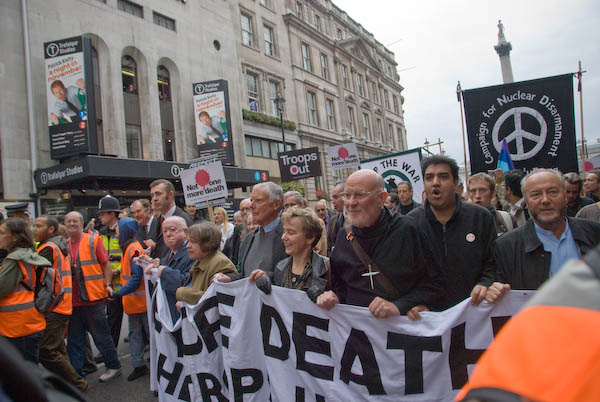
They wanted to march to make clear that all UK troops should come back here now. The invasion of Iraq in 2003 had led to the fall of Saddam Hussein but had been made without any real thought for the future of Iraq – except for the profits which US companies hoped to make. Saddam’s civil and military administration which had united the country were simply removed rather than being put to use to keep the country running and chaos reigned. Iraq didn’t need foreign armies but needed real support to set up a new civil society and that had not been forthcoming.
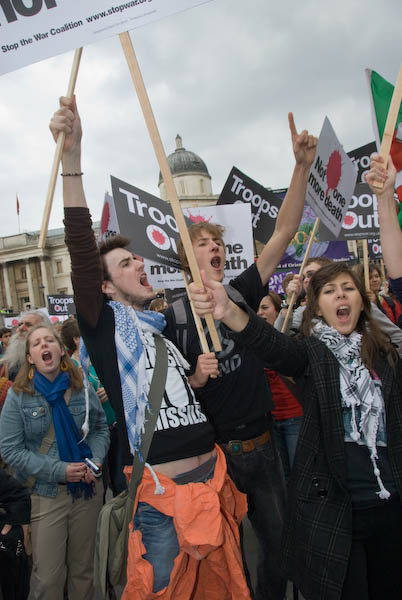
Gordon Brown tried to ban the protest, using “Sessional Orders” to the Commissioner of the Metropolitan Police for him to prevent the march under section 52 of the Metropolitan Police Act 1839. But CND and Stop The War made clear it would go ahead despite this.
On the morning of the march Prime Minister Gordon Brown – probably reacting both to huge public pressure and legal advice – lifted the ban, thus avoiding a huge burden on both police and courts. They might otherwise have ended with thousands of arrests – and cases which the courts would probably throw out.
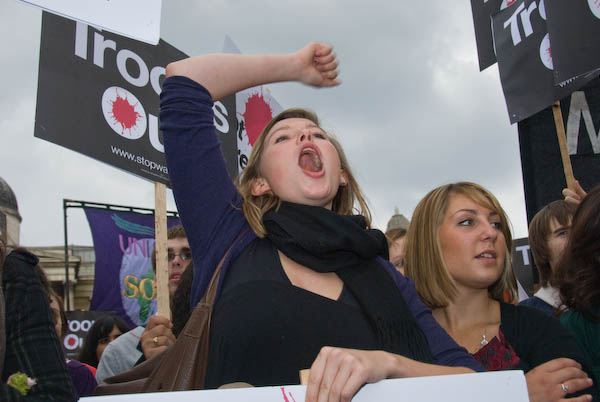
Around ten years later the powers that the Brown government had attempted to use were officially recognised to no longer have any legal effect – something I suspect had been part of legal advice given to Brown in 2007.
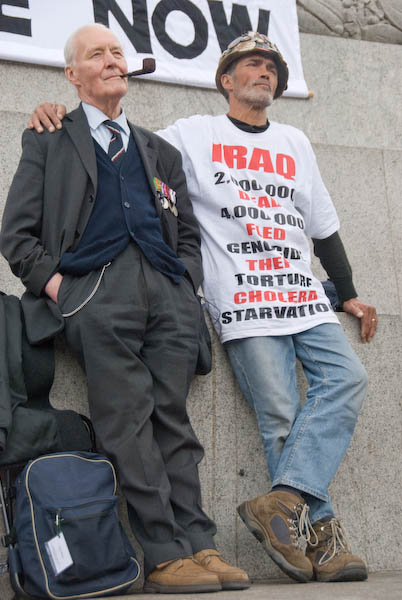
Last Saturday, October 4th 2025, I again watched a protest by Defend Our Juries in defiance of the government’s proscription of Palestine Action under terrorist laws, with police arresting almost 500 people for sitting holding a piece of cardboard with a message supporting the banned group. Many of those arrested seemed to be elderly and some also disabled, though there were also younger people.
The protestersy presented no danger to public order – other than challenging the legally doubtful ban on the group who few outside the government and those making arms for sale to Israel who had been heavily lobbying for a ban – believe could be described as terrorists. And this is something to be shortly tested in the courts. And the arrests made the police look unfeeling and stooges of the government rather than a force acting with the consent of the people.
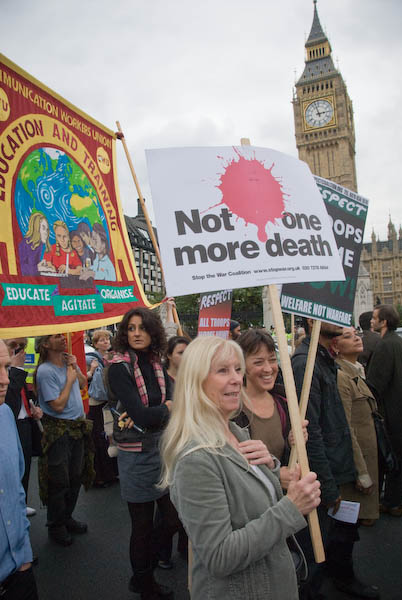
Perhaps our current Labour government should have learnt from the example of George Brown in 2007. Supposedly we are a nation where the police operate by consent – which was clearly not the case here – and the police should have made this clear to the government and simply ignored this and earlier protests by ‘Defend Our Juries’. Which would of course have made the action – with people coming on purpose to be arrested and waiting patiently for hours for it to happen – totally ineffectual. And we do after all we have many laws which people – especially motorists – break every day and the police ignore.
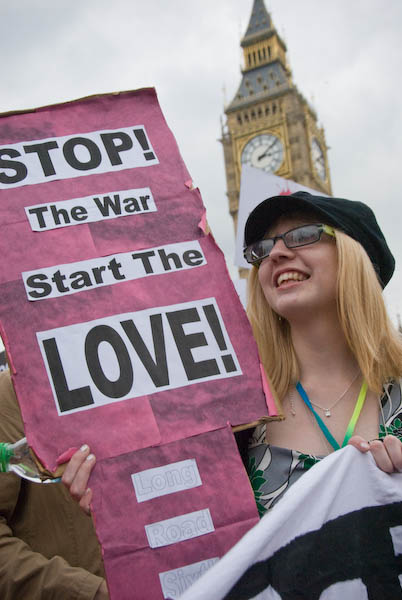
Defend Our Juries also protests against the practice by some judges in some courts to prevent those charged from making a defence of their actions and instructing juries that they cannot use their consciences in coming to decisions – both vital protections essential to a fair legal system. Actions introduced into our legal system because successive governments have been angered by the decisions reached by juries in some cases. But it should not be the job of our legal system to serve the government but to serve the people and these developments endanger the whole basis of trial by jury which protects us and our democracy.
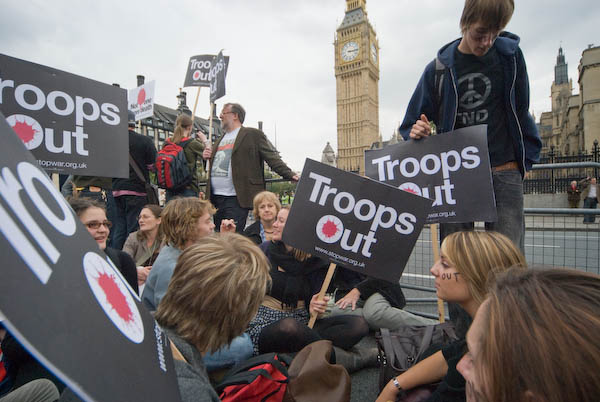
Here’s what I wrote in 2007 about the march and rally on 8th October 2007. All the pictures in this post come the event and there are many more on My London Diary.
Brian Haw’s t-shirt summed up the disaster: “Iraq 2,000,000 dead 4,000,000 fled genocide theft torture cholera starvation” though there were a number of other crimes to mention, in particular the poisoning of so much the area for generations to come through the dumping there of so much of our nuclear waste in the form of ‘depleted uranium’ weapons.
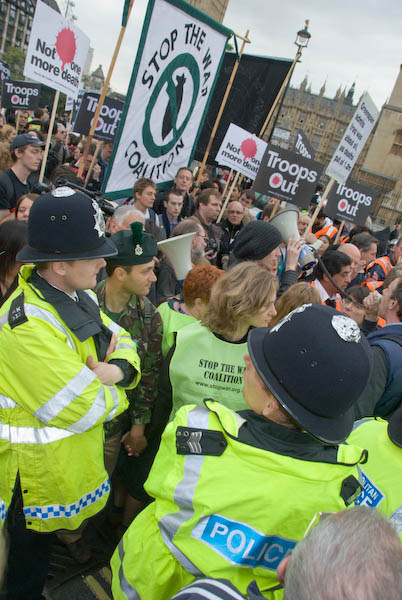
I was surprised at the level of support for Monday’s demonstration, a day when many of the supporters of the campaign would have been at work, and I had expected hundreds rather than the three thousand or so who actually turned up. The government’s clumsy ban on the event, using 1839 legislation passed against the Chartists, drummed up support, and to such an extent that on the morning of the rally they had to climb down and allow the march and the lobby of parliament to proceed.
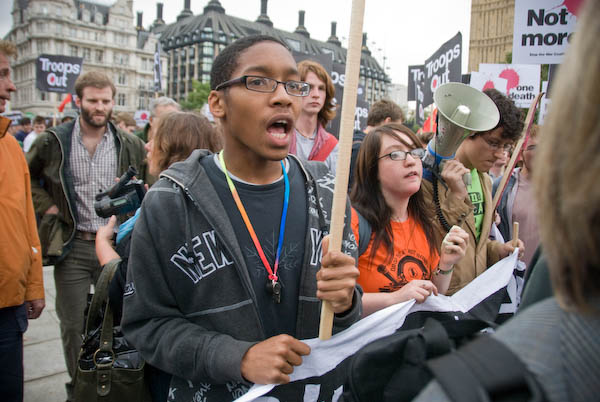
Later in the day, the success of the demonstration even became rather an embarrassment for Stop The War, who when I left around 4.30pm, two hours after the start of the march, were trying to help police in clearing the large crowd who were still blocking Parliament Street, Parliament Square and St Margaret St, urging them to move along to College Green. Later in the day a small group of protestors took down the barriers on the grassed area of parliament square, piling them up.
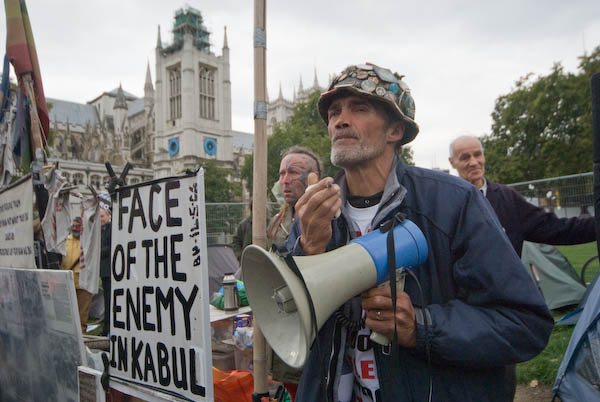
But the real embarrassment was for Gordon Brown, forced to climb down and allow democratic protest. Unfortunately he didn’t do the decent and sensible thing (and surely now inescapably the logical thing in the interests of both Iraq and Britain) and announce a speedy withdrawal of troops to be replaced by a real programme of support for the Iraqi people.
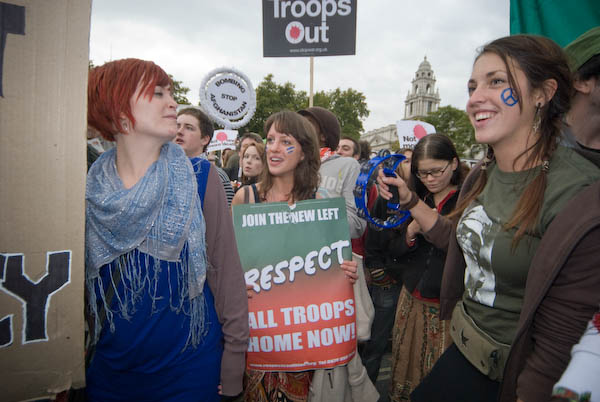
Although doubtless pressure from the police at the highest level was obviously vital in the decision to allow the march to go ahead, there were clearly a few officers in charge on the ground who weren’t happy.
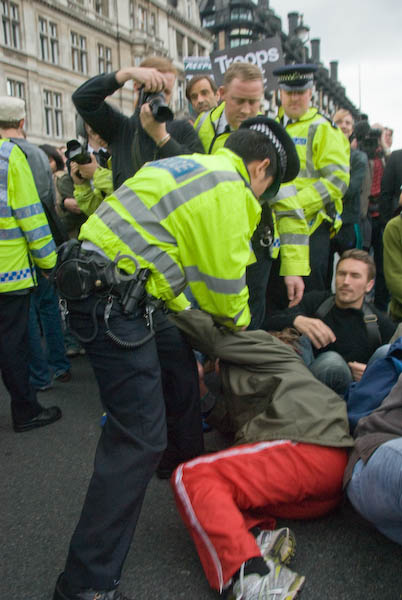
As we went down Whitehall, they obstructed photographers trying to photograph the event quite unnecessarily – so obviously so that some of the officers actually carrying out the orders were apologising to me as they did so. And later in the day a few tempers flared and there were a few fairly random assaults on demonstrators.
It did seem an unnecessarily provocative move to bring back Inspector Terry, apparently the man responsible for much of the harassment of Brian Haw and the officer in charge at the 2006 ‘Sack Parliament’ demo last year (photographer Marc Vallée who was injured is now taking legal action against the Met, with the support of the NUJ.)
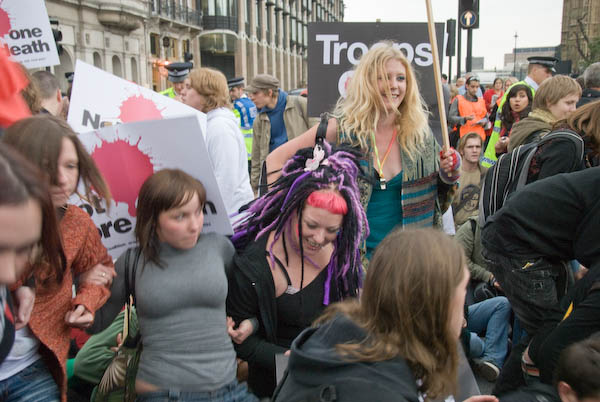
British troops remained in Iraq in a combat role until 2009, with smaller numbers there mainly involved in training until the final withdrawal in 2011. You can read more about my NUJ colleague Marc Vallée being thrown to the ground by police and his eventually reaching a settlement on the EPUK web site.
Many more pictures from the march and rally on My London Diary at
Bring All the Troops Home NOW.
Flickr – Facebook – My London Diary – Hull Photos – Lea Valley – Paris
London’s Industrial Heritage – London Photos
All photographs on this page are copyright © Peter Marshall.
Contact me to buy prints or licence to reproduce.
